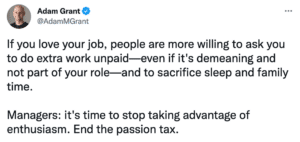Last week, many of my buddies sent me a tweet by Adam Grant about the Passion Tax. A catchy phrase for working your most dedicated people to the bone. I think to abolish the passion tax, we have to know what boundaries sound like.

Adam cites a study from Aaron Kay from Duke’s Fuqua Business School.
Passionate People WANT the Work
Kay’s team of researchers conducted eight studies across 2,400 total participants and found conclusive evidence that indeed, participants both found that it was more legitimate to ask more from workers that either are more passionate about their jobs or are in roles more associated with passion (think entertainment, sports, arts, travel, etc.).
But here is what I found more interesting.
Researchers also found that people who were exploited in their jobs are more likely to be seen as passionate about their work.
The tendency to exploit passion stems from two beliefs:
- The work itself is a reward.
- The team member would have volunteered.
While this doesn’t necessarily relate to passion, I would add a third hypothesis.
They believe by taking on more; they position themselves better for future opportunities.
Whether it is because of passion, which is what Grant was referring to, or something else, people who are smart, reliable, and high-performers can get a lot of work dumped on their plate. And I don’t believe that it’s always a conscious decision by leaders, and it happens so organically.
Boundaries are One Antidote to the Passion Tax
Toxic organizations and managers exist that don’t give a damn about you or your boundaries. Still, the more common scenarios are those workplaces that exist that unconsciously exercise the passion tax.
So many of us have big dreams coupled with the belief that our job is to say yes to everything. I know I have BEEN GIVEN and GIVEN this advice – say yes to everything! If you can be seen as a team player, the promotions can come your way. Sure. Sometimes. Maybe? And if so, at what cost?
We end up not only tolerating last-minute requests or long, cumbersome hours, but we jump at the chance. Not because we want to, but because we feel like we have something to prove.
I firmly believe that in some cases, being the one with the most passion or the one without boundaries means that you become the dumping ground, and you become the workhorse. And at promotion time, guess who doesn’t want to lose their workhorse?
Why Do We Lack the Boundaries?
- No one teaches us how to know our boundaries. And once we know, we have no clue what boundaries sound like.
- Many of us have a deep need to prove something, and the amount of work we take on and deliver is certainly in our control. But again, at what cost.
- Stress is romanticized in a peculiar way. Do we believe that if we are the busiest, we may be the most valuable? Or the most successful? Or have the most potential?
What Boundaries Sound Like
- Have a firm grip on your responsibility and what isn’t your responsibility.
- Get clear and start setting the boundaries you need to thrive. Examples:
- I leave at 5:00 every day and don’t get back on email until 8:00 the following day.
- I don’t check my phone after 7:00.
- I don’t work on the weekends.
- I will not work on vacation.
- I will not work when I’m with my child at a performance/game.
- Develop tight language to allow for you to start maintaining boundaries:
- I leave at 5:00 every day and don’t get back on email until 8:00 the following day.
- Ex: Thanks for thinking of me to do that work. I can either push my work in the morning and start this first thing tomorrow or prioritize it after I finish my next project. What would you prefer?
- I don’t check my phone after 7:00.
- The next day: I saw your text this morning. I wanted to give you a heads up that I don’t check my phone after 7:00 unless we are on deadline.
- I don’t work on the weekends.
- Ex: While I would like to help because this project sounds interesting, I can’t work this weekend. I’d be happy to pick it up on Monday if that works for you.
- I will not work on vacation.
- Before you leave: I won’t be taking my computer and won’t be responding on my phone. Thank you so much for covering for me while I’m out. I appreciate it and look forward to doing the same for your next vacation.
- I will not work when I’m with my child at a performance/game.
- Before you leave: I am headed to my son’s dance recital. I won’t be checking my phone but can respond later this evening or tomorrow.
- I leave at 5:00 every day and don’t get back on email until 8:00 the following day.
- EMPLOYEE CANDID CURIOSITY. Get curious about your feelings when you are asked to do something that is not your responsibility or takes you outside of a boundary. Questions to ask yourself:
- What am I feeling right now?
- Why do I feel like I have to say yes?
- What will I sacrifice if I say yes?
- How can I effectively hold my boundaries with respect?
- MAINTAIN YOUR BOUNDARIES. We teach people how to treat us. So if you don’t uphold your boundaries, you can’t blame the other person for trying. If you find yourself not sticking to your own boundaries, go back to #4.
I’m not in the business of bullshitting you that every boss will accept your boundaries with open arms. But here’s what I do know: I know way more leaders who would instead protect their sanity in the long-term by sacrificing something in the short term. Learn what boundaries sound like…your own boundaries.


